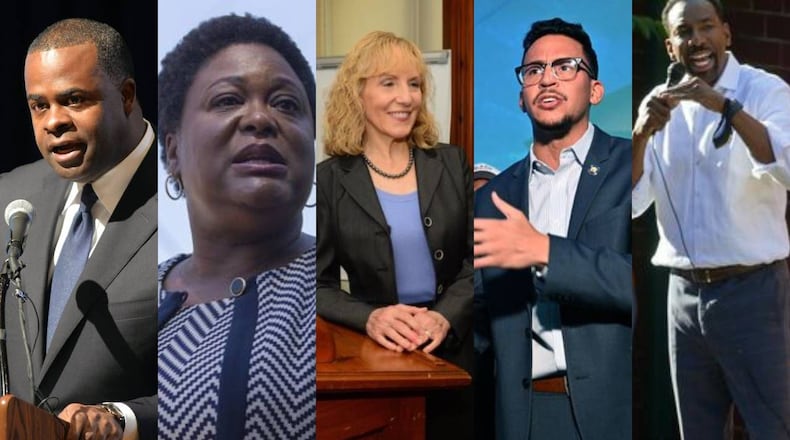Atlanta’s five leading mayoral candidates tangled over crime, public safety and the fate of the city jail in a televised debate Sunday that at times turned testy over contenders’ records on ethics, corruption and financial stewardship.
During the faceoff, which was co-hosted by WSB-TV and the Atlanta Police Foundation, the candidates sought to distinguish themselves by discussing their plans for hiring new cops and improving law enforcement morale — two days before early voting begins. More than two in five city voters said they were undecided in the latest Atlanta Journal-Constitution poll.
Former Atlanta Mayor Kasim Reed said he would visit officers at roll calls and shift changes to repair the strained relationship between City Hall and law enforcement and emphasized that officers will have due process should they become involved in disputes. He vowed to quickly hire 750 new cops and use some $200 million in reserve funding to fund overtime work “on a constant basis.”
“The bottom line is in 180 days you will see the numbers going down,” he told moderator Justin Farmer of Channel 2 Action News.
Felicia Moore said a “comprehensive approach” was needed to tackle crime rates, which have surged both in Atlanta and nationally over the past two years. The City Council president said she’d hire more cops and establish an open line of communication with the police department while providing activities to keep children engaged after school and enforcing city codes for bars and nightclubs.
City Councilman Antonio Brown, meanwhile, said his administration would focus on rooting out generational poverty.
“We can’t arrest ourselves out of this problem,” said Brown, who noted that both his parents were incarcerated by the time he was 12. “We need to restructure our public safety system, and I plan to do that.”
The focus on crime was no surprise. It was far and away the most pressing issue for voters polled by the AJC last month. Forty-four percent said that was the top issue facing the city of Atlanta, and seven in 10 voters said the city was headed in the wrong direction in its response to crime.
Findings from the Centers for Disease Control and Prevention released this past week showed that the country’s homicide rate rose 30% from 2019 to 2020, marking the highest increase in modern history.
The surge was even higher in Atlanta. The city’s police department investigated 157 homicide cases in 2020, up from 99 in 2019 and the most in more than two decades. Last week, the city recorded its 122nd homicide, up from the 106 investigated as of Oct. 5, 2020, according to APD data.
Four of the candidates — Reed, Moore, attorney Sharon Gay and City Councilman Andre Dickens — said that they wanted to keep open the mostly empty city jail, especially amid overcrowded conditions in the Fulton County jail.
“It’s almost unfathomable in terms of the human situation out there where people are stacked on top of each other,” said Dickens of the situation at the Fulton facility. He said he’d like the city jail to be “mixed-use” and be able to house detained people on some floors and those facing behavioral challenges on others, for example.
Gay said Atlanta needs a place to process people who have violated city violations.
“We lose control over that, we lose our control over how they’re charged and how they’re treated if we only have a county facility,” she said.
Brown said the city jail should close because at its peak the vast majority of the people detained there — 90%, he estimated — were Black.
“Something doesn’t make sense about that number,” he said, adding that the city should instead be focused on moving people into care and services and helping them reacclimate to society.
The evening wasn’t without its fireworks. The sharpest back-and-forth involved ethics and Reed’s eight-year tenure at City Hall. Two of the ex-mayor’s personal attorneys said Friday that they were told by the U.S. Attorney’s Office that Reed was not a target in the Atlanta City Hall corruption investigation.
That wasn’t enough for Moore, who’s been neck-and-neck with Reed atop the polls. She said the Reed administration brought a “cloud of corruption” over City Hall that would be another distraction should he be elected to a third term.
“It will not be scandal-free, because it’s not scandal-free now,” she said, soliciting a sharp rebuke from Reed about her record on property taxes, police body cameras and funding community centers while on the City Council.
Reed also attacked Dickens when the latter noted that more than a half-dozen of Reed’s former associates had netted bribery or fraud charges from the feds, including his chief financial officer, chief procurement officer and a deputy chief of staff.
Reed said that he “accept(s) responsibility for the people who did wrong in my administration.”
“I have a concrete plan to move forward and make sure that it never happens again,” the former mayor said. He vowed that he and his staff would release their income tax returns and that his direct reports complete quarterly ethics training and go through “a deep background check” before they’re hired. Reed said he’d also require registration for lobbyists.
Reed and Moore were in a statistical tie in the AJC’s September poll with 23.5% and 20.4% of the vote, respectively. Dickens, Gay and Brown each had less than 6% of the vote.
The sheer number of candidates for mayor — 14 have qualified to have their name on the ballot — makes it likely that the race will go to a runoff on Nov. 30. If no candidate secures more than 50% of the vote on Nov. 2 then the top two finishers will face off in the overtime contest.
About the Author
Keep Reading
The Latest
Featured



